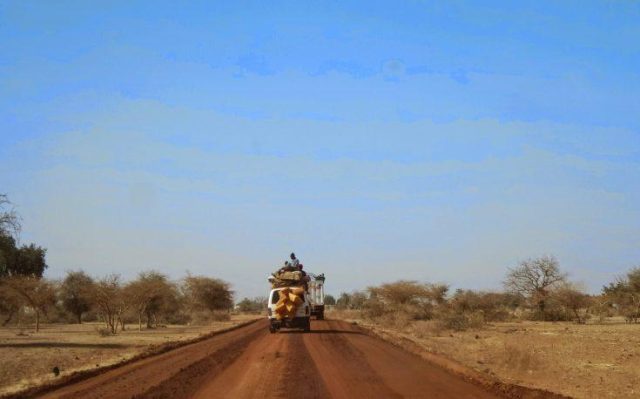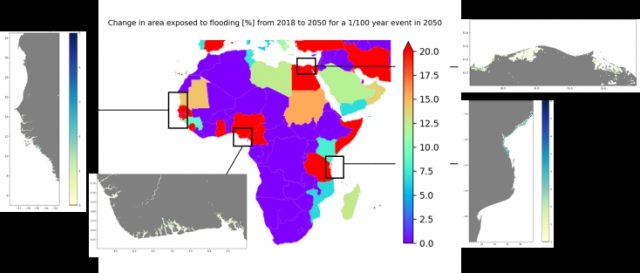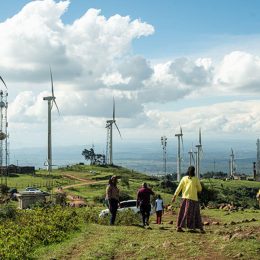Supporting the Africa Climate Mobility Initiative
The Africa Climate Mobility Initiative (ACMI) is a joint undertaking of the African Union Commission (AUC), the United Nations, and the World Bank (WB). The ACMI is designed to support the efforts of the AUC and African nations to both harness the potential of mobility in the context of the climate crisis, as well as to address climate-forced displacement and migration.

ACMI leads efforts to enable
- Data for Mobility:
Invest in the evidence base through data collection, including through the development of the Africa Climate-Forced Mobility Model and build standing capacity for modeling of & research on climate mobility on the continent in collaboration with African research institutions and centers of excellence. - Knowledge & Resilience:
Develop a continent-continent-wide network of change agents from academia, policy and practice through the establishment of a dedicated Community of Practice that brings together and drives cutting-edge research, analysis, policy development and programming on the continent as regards the scope, opportunities, and implications of climate-forced mobility in Africa. - Action for Impact:
Promote strategic partnerships for climate mobility on the continent through the establishment of an Accelerator for Action that pools resources to drive efforts to harness opportunities for economic integration and green growth while ensuring that the adverse consequences of climate forced mobility are addressed holistically.

The Africa Climate-Forced Mobility Report
Over the course of 2022, the ACMI will advance its objectives through the preparation of a comprehensive report on climate forced mobility in the continent entitled 'Shaping the Future of Mobility in Africa: Addressing Climate Forced Displacement Migration' as well as an Agenda for Action. The report and the Agenda for Action will be presented on the margins of COP 27 in late 2022. This effort is supported by a wide range of actors, including the Robert Bosch Foundation, the Open Society Foundations, the Ford Foundation, the Porticus Foundation, the Mayors Migration Council, and the Union of Economic and Social Councils of Africa.
The report is an opportunity to promote a groundbreaking new narrative in the global and regional fight against global warming, pressing for people centered climate action in line with the Africa Agenda 2063 and the Sustainable Development Goals. This is especially important given that most global efforts in the climate action field have primarily focused on transforming the carbon economy into a green economy the emphasis has been on the impact on institutions and industry, as opposed to individuals and communities. The African continent would greatly benefit from such a people centered approach to climate action and is well placed to play a leading role in forging a narrat ive and actions with global resonance.
The report and Agenda for Action will play a critical role in advancing the Secretary General’s call for strong action and the redoubling of ambition to address the climate crisis in Africa They also will support the AUC, Regional Economic Communities ( and African countries and cities in developing norms, policies and solutions for managing climate forced displacement and migration on the continent.
The ACMI will thus address two of the most challenging phenomena confronting not just Africa but also other regions around the world.

Our involvement
No one should be left behind when it comes to access to enough and safe drinking water and adequate sanitation and hygiene services. At Deltares we care about the inclusion of migrants and other vulnerable groups in the achievement of the SDGs. We perform this task bearing in mind the natural resources and the need of protecting the environment not only within the settlements for refugees and internally discplaced persons (IDPs), but also looking for integrated solutions that can bring co-benefits to both the refugees, IDPs, and the local population. Deltares is leading the consultations workstream on Coastal and Delta Areas and the future related activities.
Leading the consultation workstream on Coastal and Delta Areas
The ACMI Consultations workstream on Coastal and Delta Areas will bring a focus on African coastal areas to the research and modelling undertaken for the ACMI. It will review the findings from data collection on people’s decisions to move or stay in the context of climate impacts which has been collected through household interviews and focus group discussions conducted by the Mixed Migration Center.
The workstream will also review the results of the modelling - by the Colombia University - of future climate mobility scenarios from the perspective of coastal and delta areas to see where these might become hotspots of in- or outmigration and which factors are decisive in shaping different population redistribution scenarios.



